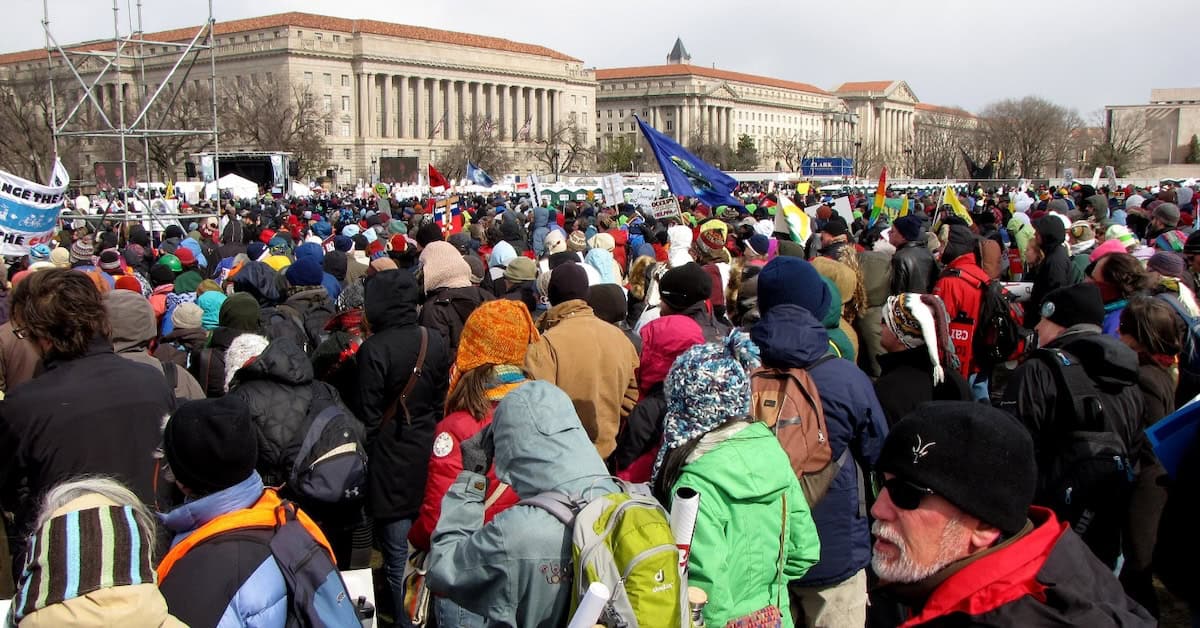It is revealing to contrast President Donald Trump’s sensible approach to economic recovery from the COVID-19-induced shutdown with those of his opponents and more politically-correct politicians. Trump is focussed on boosting the economy and urgently needed job creation, while maintaining adequate environmental protection. Those on the left of the political spectrum often put the environment first, seemingly unconcerned that April’s 14.7% US unemployment rate was the highest since 1939. They are also apparently unaware that, as illustrated by Climate Change Reconsidered II: Fossil Fuels, a 780-page report issued last year by the Nongovernmental International Panel on Climate Change, without a strong economy, no one cares much about nature.
When discussing Trump’s June 4 EO, Dr. Barbara Lichman wrote in her June 16 article on the Aviation and Airport Development Law News website:
“The bottom line is that the stage is being set for NEPA and other environmental protections to fall back to second place when they appear to conflict with the necessities of economic growth.”
Yes, and that is exactly how it should be. Let’s dig into this a bit more deeply.
On June 4, Trump signed a Presidential Executive Order (EO), titled “Accelerating the Nation’s Economic Recovery from the COVID-19 Emergency by Expediting Infrastructure Investments and Other Activities.” The EO’s purpose is “to speed infrastructure investments and to speed other actions in addition to such investments that will strengthen the economy and return Americans to work, while providing appropriate protection for public health and safety, natural resources, and the environment, as required by law.”
This is a logical extension of the Trump Administration’s strategy since attaining office to streamline and reform the outdated regulatory system that has impeded the economy with unnecessary paperwork and expensive delays, a strategy that is even more important during the current economic crisis. While the president’s EO is directed mostly at expediting infrastructure projects via the Department of Transportation, other agency projects may also be included.
Dr. H. Sterling Burnett, Senior Fellow with the Arlington Heights, Illinois-based Heartland Institute comments, “Trump is correct that, far too often, desirable, life saving, life enhancing infrastructure projects are delayed by unnecessary and unjustified environmental regulations.”
Frank Lasee, a former Wisconsin State Senator and an expert in energy, environment and climate change, agrees. “President Trump’s executive order to expedite transportation projects is sorely needed,” said Lasee. “A focus on getting the many federal and state agencies to cooperate and eliminate duplication will go a long way to get more infrastructure built sooner. This focus on expediting will lead to better transportation, less costs and more people back to work sooner.”
Lasee concludes, “When it takes congressional action in 2012, after more than 40 years of litigation to rebuild and expand an important major St Croix bridge connecting Wisconsin and the Twin Cities, you know something is broken.”
But many commentators and activists seem to not recognize this.
For example, Gina McCarthy, Environmental Protection Agency administrator under Barack Obama and now President and CEO at the Natural Resources Defense Council criticized Trump’s EO, stating,
“Abusing emergency powers to deep-six necessary environmental reviews is utterly senseless. These reviews are required by law to protect people from industries that can harm our health and our communities. Getting rid of them will hit those who live closest to polluting facilities and highways the hardest…”
But it is McCarthy’s comment that is senseless. Trump is working to streamline the application of the regulations, not get rid of them. Lasee puts it well:
“Often there are decisions made by agencies that add more time and go above and beyond the requirements of current regulations and laws. Shining a spotlight on this type of abuse, searching them out and having management intervene to follow the actual regulations will help tremendously.”
Yet other environmental groups are also attacking Trump’s EO:
“Using the global pandemic as an excuse to further erode public health and environmental protections is as cynical as it is irresponsible,” said Collin O’Mara, president and CEO of the National Wildlife Federation. “The millions of Americans facing public health challenges, staggering unemployment, and racial injustices need the White House to focus on health, jobs, and eliminating systemic racism…”
Of course, the White House is focussed on health and jobs, just not in the impractical way environmentalists want.
Even more extreme, the Center for American Progress nonsensically proclaimed:
“The Trump administration is trying to divert attention away from the crisis of racial injustice happening around the country by giving agency leads the excuse to ram through polluting projects that will prop up the dying fossil fuel industry…”
 This introduces arguably the most misguided approach to economic recovery being advocated by the left, namely using the shutdown to promote the expansion of our least effective and most expensive sources of energy—wind and solar power—over cheap and reliable fossil fuels. Groups within the US and internationally have latched on to the idea that accelerating funding for wind and solar projects will somehow augment the recovery. Even the International Energy Agency (IEA) has called on governments to prioritize a “green recovery”, the Guardian reported. The IEA has unveiled a plan for a “sustainable economic recovery of the energy sector, one that it claims would create nearly 9 million new energy jobs, increase global gross domestic product by 1.1% in each of the next three years, and make 2019 the peak year for carbon emissions,” reports Global Citizen, a group which says they are committed “to end extreme poverty by 2030.”
This introduces arguably the most misguided approach to economic recovery being advocated by the left, namely using the shutdown to promote the expansion of our least effective and most expensive sources of energy—wind and solar power—over cheap and reliable fossil fuels. Groups within the US and internationally have latched on to the idea that accelerating funding for wind and solar projects will somehow augment the recovery. Even the International Energy Agency (IEA) has called on governments to prioritize a “green recovery”, the Guardian reported. The IEA has unveiled a plan for a “sustainable economic recovery of the energy sector, one that it claims would create nearly 9 million new energy jobs, increase global gross domestic product by 1.1% in each of the next three years, and make 2019 the peak year for carbon emissions,” reports Global Citizen, a group which says they are committed “to end extreme poverty by 2030.”
If Global Citizen really wants to end extreme poverty, then they should be focussed on an expansion of our use of inexpensive, reliable fossil fuels, not phasing them out. We explained some of the problems with wind and solar power in our America Out Loud article last week, “Forget wind and solar power for COVID recovery.” Add to that the following which few politicians or activists seem to understand.
Wind turbines require that a reliable power source, typically a simple cycle natural gas-fired plant, be on all the time in the background. These gas plants provide what is called spinning reserve so as to be able to quickly ramp up when wind speeds are too low for the turbine to operate or so high that the turbine must be shut down so as not to break. In contrast to a modern stand-alone, combined-cycle gas turbine power plants which will have a thermal efficiency approaching 70%, quickly adjustable simple gas turbines operating in concert with wind turbines have efficiencies only in the mid-20%. Thus, a wind turbine with simple cycle gas-fired back up increases the fossil-fuel burn and increases the production of CO2 and pollutants.
To more easily understand this, just think of your automobile’s gasoline mileage on an open highway versus stop-and-go city driving. The costs of erratic operation of gas plants that back up wind turbines quickly wipe out the reported 4.5% fuel saving dollars by many factors. Environmentally, the damage is even more severe. This is because, if there were no windmills, the combined cycle plant would operate at its peak efficiency of over 60%, thereby burning less fossil-fuel and producing far less CO2 and atmospheric pollutants.
Perhaps the main reason so many politicians and activists are ignorant about this is because mainstream media such as CNN in America and CBC in Canada often overlook this sort of information. Here are a couple of developments ignored by most of the press:
- Renewables Threaten German Economy & Energy Supply, McKinsey Warns In New Report: Forbes, 5 September 2019 by Michael Shellenberger. A new report by consulting giant McKinsey finds that Germany’s Energiewende, or energy transition to renewables, poses a significant threat to the nation’s economy and energy supply.
- Windmills increase fossil fuel consumption and CO2 emissions, an article by C. LePair which details the many misunderstandings using the Amsterdam-Schiphol 500 MW combined-cycle fossil-fuel plant plus a 100MW windmill plant. Over a typical one-year operation, it reduced fossil-burn by 4.5% with no reduction in CO2. But increased maintenance costs occur since the advertised 20-year life cycle for a windmill is more likely 12 – 15 years and windmills are a net consumer of electricity when the wind is less than about 10 MPH.
French writer and philosopher Voltaire said, “I always make one prayer to God, a very short one, ‘O Lord, make our enemies quite ridiculous!’ God granted it.”
Too few people recognize that Trump’s enemies are quite ridiculous in their approach to rescuing the nation from the COVID-induced shutdown. We must bring this to the public’s attention whenever possible.


























Tom Harris’ and Dr. Jay Lehr’s claim that “…without a strong economy, no one cares much about nature” is wishful thinking by two pro-coal activists who know their claim is false.
Dr. Lehr and Mr. Harris described the EPA regulations being rolled back by the Trump administration as “the most successful grass roots, self-improvement program in our nation’s history.” According to Mr. Harris and Dr. Lehr, “1968 began a major legislative effort by scientists to bring knowledge of our environment to bear on procedures and regulations that could staunch the unnecessary outpouring of industrial, municipal and domestic waste into the air we breathe, the water we drink and swim in, the water wells we pump from and the soil in which we grow our food
Between 1972 and 1980, Congress passed a safety net of environmental laws that adequately protected every medium of our environment. They spawned an environmental improvement and protection program during the ensuing two decades that became the most successful grass roots, self-improvement program in our nation’s history.” (Source “We Must Loudly Contest Environmental Myths” By Dr. Jay Lehr & Tom Harris, Jan 7, 2020, America Out Loud)
The contradiction by Mr. Harris and Dr. Lehr from January to today can be explained by their partisan loyalty to Donald Trump and the political goals of the Heartland Institute.
Nonsense reply by the Dave James person or group of people, as usual. This time it is doubly bad since he commented after our past articles about this.
The claim that “…without a strong economy, no one cares much about nature” derives from what economists call Environmental Kuznets Curves (EKCs). EKCs show how environmental degradation rises with national per-capita income (although the benefits of industrialization to health and life nonetheless lead to declining rates of disease and premature deaths (i.e., to rising life expectancy)) until a certain critical point is reached, after which the environment starts to improve.
Before the creation of EKCs, many well-informed people thought that wealthier countries damaged their environment more than poorer nations. The only way out of this dilemma was to de-industrialize and reduce incomes, they thought. But we know now that the exact opposite is true. While factors such as the strength of democratic institutions, levels of educational achievement, and income equality play a role, environmental protection is closely correlated with prosperity.
Dave James may want to review the whole article since he seems to have forgotten all this. Here is the piece: https://americaoutloud.news/is-capitalism-bad-for-the-environment/
Voltaire did indeed have it right. And streamlining excessive regulations, put in place by empire-building martinets wishing to throw their weight around & make anyone wishing to gain bureaucratic approval grovel at their feet, is the best way to rein in the tin pot dictators.
Well put, indeed, Mr. Mount.
Mr. Mount description of environmental regulations directly contradicts Mr. Tom Harris’ and Dr. Jay Lehr’s opinion piece from January. “Between 1972 and 1980, Congress passed a safety net of environmental laws that adequately protected every medium of our environment. They spawned an environmental improvement and protection program during the ensuing two decades that became the most successful grass roots, self-improvement program in our nation’s history.” (Source “We Must Loudly Contest Environmental Myths” By Dr. Jay Lehr & Tom Harris, Jan 7, 2020, America Out Loud)
Great article by Tom and Jay. Hopefully the economy can bounce back quickly and not cause any more damage than has already happened.
Thanks Vanessa. It is strange more people cannot see that, without a strong economy, we do not have the resources to protect the environment. I wonder if they are simply not thinking or assume that the people that listen to them are not thinking?